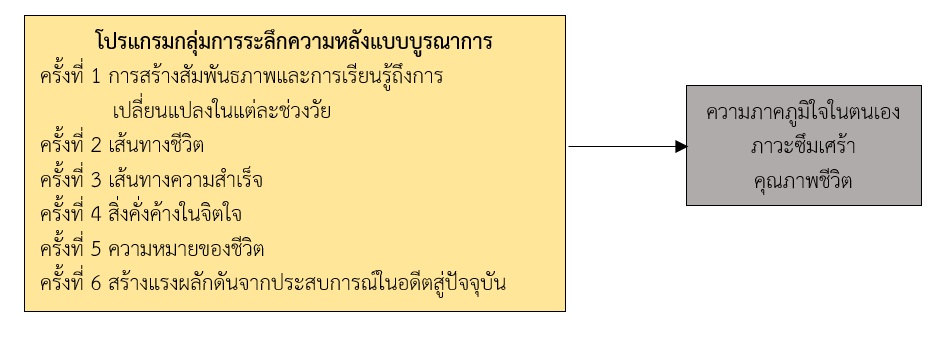การพัฒนาโปรแกรมกลุ่มการระลึกความหลังแบบบูรณาการ ต่อความภาคภูมิใจในตนเอง ภาวะซึมเศร้า และคุณภาพชีวิตของผู้สูงอายุ ในจังหวัดนครศรีธรรมราช
คำสำคัญ:
การระลึกความหลัง, ภาวะซึมเศร้า, ความภาคภูมิใจในตนเอง, คุณภาพชีวิต, ผู้สูงอายุบทคัดย่อ
การวิจัยและพัฒนานี้ เพื่อศึกษาสภาพการณ์ พัฒนาโปรแกรมกลุ่มการระลึกความหลังแบบบูรณาการ และเปรียบเทียบระดับของความภาคภูมิใจในตนเอง ภาวะซึมเศร้า และคุณภาพชีวิต ของผู้สูงอายุในระยะก่อนและหลังเข้าร่วมโปรแกรม ดำเนินการ 3 ระยะ ได้แก่ ระยะที่ 1 ศึกษาสภาพการณ์ของความภาคภูมิใจในตนเอง ภาวะซึมเศร้า และคุณภาพชีวิต จากผู้สูงอายุ จำนวน 517 คน ใช้วิธีการสุ่มกลุ่มตัวอย่างแบบหลายขั้นตอน เครื่องมือการวิจัย คือ แบบวัดความซึมเศร้าในผู้สูงอายุไทย แบบสอบถามความภาคภูมิใจในตนเอง และแบบสอบถามคุณภาพชีวิต วิเคราะห์ข้อมูลด้วยสถิติเชิงพรรณาและสหสัมพันธ์ของเพียร์สัน ระยะที่ 2 พัฒนาโปรแกรมกลุ่มการระลึกความหลังแบบบูรณาการ ระยะที่ 3 เปรียบเทียบระดับของความภาคภูมิใจในตนเอง ภาวะซึมเศร้า และคุณภาพชีวิต ของผู้สูงอายุในระยะก่อนและหลังเข้าร่วมโปรแกรม ใช้กลุ่มตัวอย่างในระยะที่ 1 จำนวน 15 คน เครื่องมือวิจัย คือ โปรแกรมกลุ่มการระลึกความหลังแบบบูรณาการ แบบวัดความซึมเศร้าในผู้สูงอายุไทย แบบสอบถามความภาคภูมิใจในตนเอง และแบบสอบถามคุณภาพชีวิต วิเคราะห์ข้อมูลด้วยสถิติ Wilcoxon Signed Rank Test ผลการวิจัย พบว่า
1. กลุ่มตัวอย่างส่วนใหญ่ไม่มีภาวะซึมเศร้า ร้อยละ 75.05 ซึมเศร้าเล็กน้อย ร้อยละ 20.70 ความภาคภูมิใจในตนเองอยู่ในระดับสูง ร้อยละ 73.89 และระดับคะแนนคุณภาพชีวิตโดยรวมอยู่ในระดับดี ร้อยละ 82.79 ระดับปานกลาง ร้อยละ 17.21 โดยภาวะซึมเศร้าของกลุ่มตัวอย่างมีความสัมพันธ์ทางลบระดับต่ำมากกับคุณภาพชีวิต (r=.148) ความภาคภูมิใจในตนเองมีความสัมพันธ์ทางบวกระดับปานกลางกับคุณภาพชีวิตอย่างมีนัยำสคัญทางสถิติที่ระดับ .01และ .001 ตามลำดับ (r=.549)
2. โปรแกรมกลุ่มการระลึกความหลังแบบบูรณาการ ประกอบด้วย 6 กิจกรรม คือ การสร้างสัมพันธภาพ เส้นทางชีวิต เส้นทางความสำเร็จ สิ่งคั่งค้างในจิตใจ ความหมายของชีวิต และสร้างแรงผลักดันจากประสบการณ์ในอดีตสู่ปัจจุบัน โดยแต่ละกิจกรรมใช้เวลา 90 นาที สัปดาห์ละ 2 วัน ๆ ละ 1 กิจกรรม
3. ภาวะซึมเศร้า หลังการเข้าร่วมโปรแกรม ฯ มีระดับต่ำกว่าก่อนเข้าร่วมโปรมแกรม ฯ อย่างมีนัยสำคัญทางสถิติที่ระดับ .001 ส่วนความภาคภูมิใจในตนเองและคุณภาพชีวิตหลังเข้าร่วมโปรแกรม ฯ สูงกว่าการเข้าร่วมโปรแกรม อย่างมีนัยสำคัญทางสถิติที่ระดับ .05 และ .001 ตามลำดับ
โปรแกรมกลุ่มการระลึกความหลังแบบบูรณาการ สามารถเสริมสร้างความภาคภูมิใจในตนเอง ภาวะซึมเศร้าลดลง และมีคุณภาพชีวิตที่ดีในผู้สูงอายุได้
เอกสารอ้างอิง
Atchley, R. C. (1989). A Continuity Theory of Normal Aging. Gerontologist, 29(2), 183-190.
Barakovi´c, S., Husi´c, J. B., van Hoof, J., Krejcar, O., Maresova, P., Akhtar, Z. & Melero, F. J. (2020). Quality of Life Framework for Personalised Ageing: A Systematic Review of ICT Solutions. International Journal of Environmental Research and Public Health, 17, 2940. https://doi:10.3390/ijerph17082940
Bazooband, A., Baghbanian, A., & Torkfar, G. (2016). A study of Group Reminiscence Therapy and Emotional Intelligence among Elderly Members. Geriatric Care, 2, 5927. https://doi: 10.4081/gc.2016.5927
Bodner, E., & Bergman, Y. S. (2016). Loneliness and Depressive Symptoms among Older Adults: The Moderating Role of Subjective Life Expectancy. Psychiatry Research, 237, 78–82.
Bohlmeijer, E., Smit, F., & Cuijpers, P. (2003). Effects of Reminiscence and Life Review on Late-Life Depression: A Meta Analysis. International Journal of Geriatric Psychiatry, 18(12), 1088-1094.
Bulechek, G., Butcher, H., & Dochterman, J. (2008). Nursing Interventions Classification (NIC) (5th ed.). St. Louis: Mosby-Elsevier
Chen, T-J., Li, H-J., & Li, J. (2012). The Effects of Reminiscence Therapy on Depressive Symptoms of Chinese Elderly: Study Protocol of a Randomized Controlled Trial. BMC Psychiatry, 12, 189. http://www.biomedcentral.com/1471-244X/12/189 (Open Access)
Chiang, K-J., Chu, H., Chang, H-J., Chung, M-H., Chen, C-H., Chiou, H-Y., & Chou, K-R. (2010). The Effects of Reminiscence Therapy on Psychological Well - Being, Depression, and Loneliness among the Institutionalized Aged. International Journal of Geriatric Psychiatry, 25(4), 380–388
Hinkle, D. E. (1998). Applied Statistics for the Behavior Sciences. (4th ed.). New York: Houghton Mifflin.
Khalil, A. A., & Abed, M. A. (2014). Perceived Social Support is a Partial Mediator of the Relationship Between Depressive Symptoms and Quality of Life in Patients Receiving Hemodialysis. Archives of Psychiatric Nursing, 28(2), 114–118. http://dx.doi.org/10. 1016/j.apnu.2013.11.007.
Korte, L., Cappeliez, P., Bohlmeijer, E. T., & Westerhof, G. J. (2012). Meaning in Life and Mastery Mediate the Relationship of Negative Reminiscence with Psychological Distress among Older Adults with Mild to Moderate Depressive Symptoms. European Journal of Ageing, http://doi: 10.1007/s10433-012-0239-3
Lei, P., Xu, L., Nwaru, B. I., Long, Q., & Wu, Z. (2016). Social Networks and Health-Related Quality of Life among Chinese Old Adults in Urban Areas: Results from 4th National Household Health Survey. Public Health, 131, 27-39.
Mahatnirunkul, S., Tantipiwattanaskul, W., Wongsuwan, K., & Prommanajirangkul, W. (1998). Comparison of the WHOQOL-100 and the WHOQOL-BREF (26items). Journal of Mental Health Thailand, 5, 4-15. (In Thai)
Meléndez-Moral, J. C., Charco-Ruiz, L., Mayordomo-Rodríguez, T., & Sales-Galán, A. (2013). Effects of a Reminiscence Program among Institutionalized ElderlyAadults. Psicothema, 25(3), 319-323. https://doi: 10.7334/psicothema2012.253
Meléndez-Morala, J. C., Fortuna-Terrerob, F. B., Sales-Galána, A., & Mayordomo, T. (2015). Effect of Integrative Reminiscence Therapy on Depression, Well-being, Integrity, Self-Esteem, and Life Satisfaction in Older Adults. The Journal of Positive Psychology, https://doi: 10.1080/17439760.2014.936968 Rodríguez
O'Rourke, N., Bachner, Y. G., Cappeliez, P., Chaudhury, H., & Carmel, S. (2015). Reminiscence Functions and the Health of Israeli Holocaust Survivors as Compared to other Older Israelis and Older Canadians. Aging & Mental Health, 19(4), 335-346.
Orth, U., & Robins, R. W. (2013). Understanding the Link Between Low Self-Esteem and Depression. Current Directions in Psychological Science, 22, 455-460. https://doi.org/10.1177/0963721413492763
Pinquart, M., & Forstmeier, S. (2012). Effects of Reminiscence Intervention on Psychosocial Outcomes: A Meta - Analysis. Aging Mental Health, 16, 541-558. https://doi: 10.1080/13607863.2011.651434. (PubMed)
Sharath, S., & Nuthan, R. (2020). A Study to Assess the Effect of Reminiscence Therapy on Psychological Well-Being, Depression, and Loneliness among Elderly in Selected Old Age Homes of Mysore. IP Journal of Paediatrics and Nursing Science, 3(1), 19-23. http://doi.org/10.18231/j.ijpns.2020.003
Sinchaiwanichakul, C., & Kespichayawattana, J. (2018). Factors Related to Healthy Aging among the Older Persons in Community-Dwelling of Bangkok Metropolitan. Journal of The Royal Thai Army Nurses, 19(Supplement), 100-109. (in Thai)
Srikuankaew, A., Jiawiwatkul, A., & Thayansin, S. (2018). The Relationship Between Happiness, Health Literacy and Quality of Life of Elderly: A Case Study in Wiang Elderly School, Fang District, Chiang Mai Province. MFU Connexion, 7(2), 76-95. (in Thai)
Train the Brain Forum Committee (Thailand). (1993). Thai Mental State Examination. Siriraj Hospital Gazette, 45, 359-374.
Unalan, D., Gocer, S., Basturk, M., Baydur, H., & Ozturk, A. (2015). Coincidence of Low Social Support and High Depressive Score on Quality of Life in Elderly. European Geriatric Medicine, 6(4), 319–324. https://doi: 10.1016/j.eurger.2015.02.009.
WORLD HEALTH ORGANIZATION. (WHO). (2006). The WHOQOL-OLD Module – Manual. https://www.who.int/mental_health/evidence/WHOQOL_OLD_Manual.pdf
Zhou, W., He, G., Gao, J., Yuan, K., Feng, H., & Zhang, C. K. (2012) The Effects of Group Reminiscence Therapy on Depression, Self - Esteem, and Affect Balance of Chinese Community - Dwelling Elderly. Archives of Gerontology and Geriatrics, 54, 440–447.

เผยแพร่แล้ว
ฉบับ
ประเภทบทความ
สัญญาอนุญาต
1. บทความหรือข้อคิดเห็นใด ๆ ที่ปรากฏในวารสารเครือข่าย วิทยาลัยพยาบาลและการสาธารณสุขภาคใต้ ที่เป็นวรรณกรรมของผู้เขียน บรรณาธิการหรือเครือข่ายวิทยาลัยพยาบาลและวิทยาลัยการสาธารณสุขภาคใต้ ไม่จำเป็นต้องเห็นด้วย
2. บทความที่ได้รับการตีพิมพ์ถือเป็นลิขสิทธิ์ของ วารสารเครือข่ายวิทยาลัยพยาบาลและการสาธารณสุขภาคใต้







